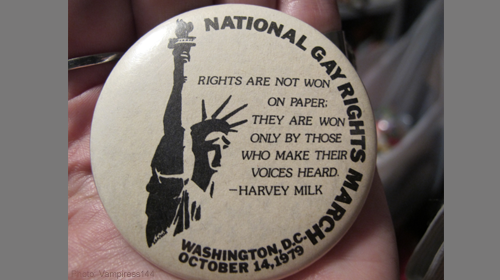
On this date in 1979, at least 75,000 people participated in the National March on Washington for Lesbian and Gay Rights. The event marked the first time supporters of lesbian and gay rights came together for a national rally (at the time, the rights of transgender and bisexual people weren't widely recognized as part of the same struggle). March organizers announced five specific goals:
- Pass a comprehensive lesbian/gay rights bill in Congress
- Issue a presidential executive order banning discrimination based on sexual orientation in the federal government, the military, and federally contracted private employment
- Repeal all anti-lesbian/gay laws
- End discrimination in lesbian-mother and gay-father custody cases
- Protect lesbian and gay youth from any laws which are used to discriminate, oppress, and/or harass them in their homes, schools, jobs, and social environments.
That was 34 years ago (for context, the number one song in America that week was one of Michael Jackson's early solo hits). And there's no doubt that the LGBT rights movement has achieved a lot of successes over that time. But looking more closely, how are we doing on each of the goals?
- Congress has yet to pass a comprehensive anti-discrimination bill, or even a ban on employment discrimination against LGBT people. However, the ACLU is part of Americans for Workplace Opportunity, a diverse coalition of organizations currently fighting for passage of the Employment Non-Discrimination Act (ENDA), and polls show that a strong majority of Americans support passage of ENDA.
- President Clinton in 1995 issued an executive order banning sexual orientation discrimination across most of the federal government. Openly gay and lesbian Americans finally became eligible to serve in the armed forces in 2011. Yet we're still waiting on a presidential executive order protecting LGBT people from discrimination by federal contractors.
- We've succeeded in eliminating a great many anti-gay laws, both by securing court rulings that such laws were unconstitutional and by persuading legislatures to repeal them. But they're not all gone. From marriage exclusions in 37 states that continue to harm gay and lesbian couples and their families, to laws purporting to criminalize intimacy between people of the same sex that remain officially on the books in several states even though the Supreme Court found them unconstitutional in 2003, there's much work to be done on eliminating anti-gay laws.
- The law in most states by now makes clear that a parent's sexual orientation doesn't determine whether his or her raising a child is in the best interests of that child. On the other hand, gay and lesbian parents in some states continue to face discriminatory "paramour" restrictions that impair their ability to parent their children while living with a same-sex partner. In addition, a few states continue to restrict gay and lesbian prospective parents' ability to provide loving homes for children through adoption and foster care. The ACLU is hard at work on dismantling those discriminatory laws.
- Advocacy by and on behalf of LGBT youth has resulted in improved protections against discrimination and harassment, particularly in school settings. But several states still mandate teaching anti-gay messages to public school students, and in recent years legislators in states like Tennessee have proposed "Don't Say Gay" bills that would have further marginalized vulnerable LGBT young people. Our work in this area, too, is far from done.
All told, we're only about halfway to achieving the specific goals set by the organizers of the original March on Washington for Lesbian and Gay Rights. Of course, as priorities have shifted, the LGBT rights movement has also celebrated some successes that those bell-bottomed marchers probably didn't even dream of. In any case, here's hoping that achieving the rest of 1979's gay rights to-do list doesn't take another 34 years!
Learn more about LGBT rights and other civil liberties issues: Sign up for breaking news alerts, follow us on Twitter, and like us on Facebook.

